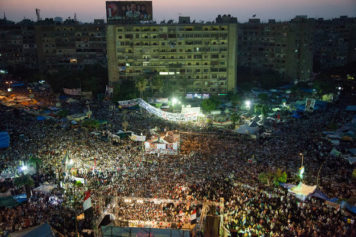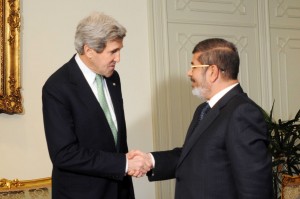Just days after thousands of angry protesters massed across Egypt on the second anniversary of the “Arab Spring,” violent clashes broke out in Port Said yesterday, resulting in 30 deaths, after 21 people were sentenced to death for their role in a deadly soccer riot last year in Port Said.
It is a stunningly unstable time for Egypt, with a cycle of violence and death repeating itself on many occasions. The rioting in Port Said yesterday was initiated by the supporters of the 21 soccer fans who were sentenced to death after 74 people died last Feb. 1 during a game between Cairo’s prestigious Al-Ahly football club and the host Al-Masry team. At least 300 people were wounded in yesterday’s conflicts.
Last February, Masry supporters went on a rampage with knives and pipes, trapping Ahly fans in a locked stadium — many were trampled to death and some died after falling from the stadium’s balconies. More than 1,000 people were injured in the melee that shocked the world. The more hard-core Ahly supporters, known as Ultras, threatened to attack police and government institutions across the country if death penalties were not handed down.
The cycle of violence may continue in March, when the former police officers charged in the case will be sentenced. The Ultras accuse the security forces of orchestrating the stadium attack as revenge for the group’s long resistance to the police state and its role in the uprising that brought down Egypt’s leader Hosni Mubarak.
“We are waiting for the March 9 verdict,” an Ultra fan told the Los Angeles Times. “This fight was between us and those responsible from the military, police and government. We vowed retribution or chaos. We will take our revenge.”
“We are satisfied with this verdict, and God willing the rest of the defendants will receive the same sentence,” said Bassem Dessouky, father of one of those killed in the stadium riot. “I thank God first and then the Ultras; they are respectful youths who helped us and stood by us every step of the way.”
Earlier this week, hostile protests against the regime of current President Mohamed Morsi took place in cities across the country, with more than 100 people injured in clashes with police.
In angry chants on the streets and in interviews with journalists, Egyptians say that the revolution of two years ago was all for naught, as hated dictator Hosni Mubarak was replaced by Morsi, who has shown his own dictatorial instincts. In the meantime, the economic desperation of many has worsened; the government has become even more inefficient and corrupt; and the Muslim Brotherhood has taken command of the country, even writing its harsh form of Islam into the constitution with Morsi’s guidance.
Tens of thousands of protesters thronged in Cairo’s Tahrir Square, where the revolution started in 2011, while smaller crowds gathered in Alexandria, Suez and Port Said, where the Muslim Brotherhood’s political party offices were torched.
There were banners outside the presidential palace in Cairo proclaiming, “No to the corrupt Muslim Brotherhood government” and “Two years since the revolution, where is social justice?” Pointedly, the protesters often chanted the same memorable slogans of revolt against Mubarak, but this time it was directed against Morsi — “Erhal! Erhal!” (“Leave! Leave!”) and “The people want to topple the regime.”
Police firing tear gas clashed with protesters throwing stones. Masked protesters tried to push through the gates outside the presidential palace, eliciting a barrage of tear gas by security forces.
In Menouf and Shibeen el-Koum, two towns in the Nile Delta, protesters blocked railway lines, disrupting train services to and from Cairo.

